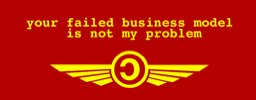From Cat-V, a great entry about IP:
The ‘intellectual property’ oxymoron
“If nature has made any one thing less susceptible than all others of exclusive property, it is the action of the thinking power called an idea, which an individual may exclusively possess as long as he keeps it to himself; but the moment it is divulged, it forces itself into the possession of everyone, and the receiver cannot dispossess himself of it. Its peculiar character, too, is that no one possesses the less, because every other possesses the whole of it. He who receives an idea from me, receives instruction himself without lessening mine; as he who lights his taper at mine, receives light without darkening me. That ideas should freely spread from one to another over the globe, for the moral and mutual instruction of man, and improvement of his condition, seems to have been peculiarly and benevolently designed by nature, when she made them, like fire, expansible over all space, without lessening their density in any point, and like the air in which we breathe, move, and have our physical being, incapable of confinement or exclusive appropriation. Inventions then cannot, in nature, be a subject of property.”
— Thomas Jefferson
“I personally think intellectual property is an oxymoron. Physical objects have a completely different natural economy than intellectual goods. It’s a tricky thing to try to own something that remains in your possession even after you give it to many others.”
-- John Perry Barlow
“Royalties are not how most writers or musicians make their living. Musicians by and large make a living with a relationship with an audience that is economically harnessed through performance and ticket sales.”
-- John Perry Barlow
Government granted monopolies have unintended consequences
So called ‘intellectual property’ laws are basically government granted monopolies, that while intending to encourage creativity have exactly the opposite effect.
Many examples and studies have shown the harmful effects of copyright and patents, but the reasons for this effects would be much more clear if one realizes that copyrights and patents are dramatic and arbitrary restrictions of both freedom of expression and free trade.
Like with any other government regulations, it is not surprising that big corporations (eg., Microsoft and Monsanto) use them to stifle competition; and other special interests (eg., the Church of Scientology) use them to censor criticisms and further their own agendas.
Aside from all the abuses and unintended consequences, copyright and patents are a great obstacle to creativity and innovation: the creations of all great thinkers, inventors and artists in history would never have been possible in a vacuum and always depend on a context consisting of all the preexisting works and ideas.

Copying isn’t theft
“Copying isn’t theft, and it isn’t piracy. It’s what we did for millennia until the invention of copyright, and we can do it again, if we don’t hobble ourselves with the antiquated remnants of a censorship system from the sixteenth century.” — Karl Fogel
Copyright infringement is not stealing, and copyright law is against the free market, it is a government sponsored monopoly.
Copyright law is routinely abused to suppress free speech and individual freedoms, it is abused by recording companies to exploit artists, it is abused by governments to control information. Copyright law is not only evil, it is also stupid, and should be ignored by anyone that believes in a free society and free markets.
Bach, Shakespeare and Michelangelo didn’t need copyright, we don’t need copyright. Copyright infringement is a victim-less crime, nobody has a right to have a monopoly on ideas or information, you have a right to keep your ideas and information private, but if you make them public, they are not your private property anymore.
Copyright also is in direct conflict with one of the most fundamental principles of a free society: free speech. Copyright has been used again and again to censor and silence critics, once more failing its supposed real purpose.
Quotes
“For one thing, there are many “inventions” that are not patentable. The “inventor” of the supermarket, for example, conferred great benefits on his fellowmen for which he could not charge them. Insofar as the same kind of ability is required for the one kind of invention as for the other, the existence of patents tends to divert activity to patentable inventions.” — Milton Friedman
Videos and Lectures
- Professor Chris Sprigman on Intellectual Property Law.
- The Surprising History of Copyright by Karl Fogel.
Links
- Against Monopoly.
- How “Intellectual Property” Impedes Competition.
- “Intellectual property” is a silly euphemism by Cory Doctorow writing for the ‘The Grauniad’.
- An excellent collection of links about IP by Stephan Kinsella.
- Some evidence that the concept of ‘intellectual property’ is a very recent one: Google Books Ngram for ‘intellectual property’.
Copyright
- Questioncopyright.org – Promoting public understanding of the history and effects of copyright, and encouraging the development of alternatives to information monopolies.
- The Promise of a Post-Copyright World by Karl Fogel.
- Abandoning Copyright: A Blessing for Artists, Art, and Society by Professor Jost Smiers.
- How Things Would Work in a Copyright Free Universe.
- Forever Minus a Day? Some Theory and Empirics of Optimal Copyright.
- Speak Out Against Copyright Extension in Europe.
- Anti-Copyright Resources at the Molinari Institute.
- Strict enforcement of copyrights jeopardizing live music in small venues – Article in boston.com
Patents
- What If The Very Theory That Underlies Why We Need Patents Is Wrong? – By by Mike Masnick.
- Patents Are An Economic Absurdity by François-René Rideau.
- World Day Against Software Patents – 24 September.
- Research on the MacroEconomic Effects of Patents




You must log in to post a comment. Log in now.